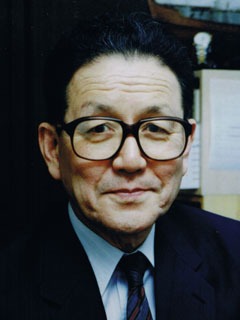Tribute to Prof. Ishii
The tribute to Prof. Yoneo Ishii took place at the Pridi Banomyong International College, Thammasat University from 2:00-5:00 in the afternoon of 4 February 2013. To commemorate the third death anniversary of Prof. Ishii, the tribute was organized by the SEASREP Foundation and the Pridi Banomyong International College, Thammasat University, with support from the Japan Foundation and more than 80 guests in attendance.
The purpose of the tribute was to bring together colleagues and friends of Prof. Ishii, Japanese and Thai academics and researchers in an effort to honor his life and work and recognize his immense contribution to the development of Thai and Southeast Asian studies.
Toward this objective, five scholars were invited from Thailand and Japan to render remembrance speeches. The speakers were:
- Dr. Charnvit Kasetsiri, Professor Emeritus, Thammasat University
- Prof. Fukui Hayao, Professor Emeritus, Center for Southeast Asian Studies, Kyoto University
- Prof. Junko Koizumi, Center for Southeast Asian Studies, Kyoto University
- Dr. Tomomi Ito, Associate Professor, Asia-Pacific Culture Studies, Kobe University
- Ms. Kimura Kanako, Ph.D. Student, Kyoto University
Hosted by former SEASREP grantee and now a lecturer at Thammasat University, Mr. Akkharaphong Khamkun, the tribute started with welcome speeches from Dr. Maria Serena Diokno, Executive Director of SEASREP, and Mr. Tadashi Ogawa, Director General, Japan Foundation Jakarta.
Dr. Diokno opened the event by recognizing Prof. Ishii as “one of the strongest influences on SEASREP and SEASREP’s most fervent advocate.” She particularly thanked Mr. Ogawa for suggesting and the tribute to Prof. Ishii. She also observed the presence of some SEASREP alumni who had received grants or taken part in SEASREP’s past activities, noting that “if Prof. Ishii were alive he would be immensely proud to know that so many young people are now well established in different universities and research institutes, continuing the project of Southeast Asian studies in the region.”
In his speech, Mr. Ogawa emphasized Prof. Ishii’s influence on Japan Foundation and his crucial role in bridging Japan Foundation and SEASREP, particularly in pushing the agenda of Japan’s collaborative role in the promotion of Southeast Asian studies. He stressed that Prof. Ishii provided a “very impressive and unforgettable suggestion” to staff of the Foundation, advising them not to turn into overly “serious bureaucrats” and cautioning them that “rigid administration kills potentialities of young talented people.” Prof. Ishii suggested instead that the Japan Foundation strike a healthy balance “between administration and creative thinking.”
Mr. Ogawa also highlighted the role Prof. Ishii played in Japan Foundation’s support for the SEASREP program. Cognizant of the weak Asian cultural connectivity, Prof. Ishii’s advice was for Japan to be an active player in the promotion of mutual understanding of Asian peoples through scholarly exchanges. Mr. Ogawa attributed to Prof. Ishii the Japan Foundation’s commitment to the SEASREP program.
Dr. Charnvit Kasetsiri, a founding member of SEASREP, presented in photographs a timeline of Prof. Ishii’s life in Southeast Asia from when he first arrived in Thailand to the relationships he formed and cultivated through the years. Many of the photographs included students who have become Southeast Asian specialists and respected scholars in the Southeast Asian region and Japan.
Remembrance speeches from invited speakers from Japan followed. Below are some important points culled from their speeches.
- Fukui Hayao: “To me, Ajarn Ishii is one of the three persons who most profoundly influenced my personality…. The range of his intellectual curiosity was extremely wide…. He was self-disciplined in history, linguistics, and many other fields…. For Ajarn Ishii, there was no end to his research interest even after retirement as a university professor. At the same time, he demonstrated superb performance as a research administrator.”
- Junko Koizumi: “Prof. Ishii led an extraordinary and uniquely innovative life and career as one of the pioneering scholars in the field of Thai studies and Southeast Asian studies in Japan…. What makes him even more distinguished as a scholar and historian who has no equal in his field is, I personally think, his solid, reliable groundwork based on the careful and critical reading of texts and detailed bibliographical examinations, and his dedication to the development of research tools and historical source materials for the benefit of all.”
- Tomomi Ito: “I was fortunate to be able to receive academic training directly from Prof. Ishii in Southeast Asian studies, in the reading of Thai literature, and also of basic Pali…. His extensive knowledge of Thai and Southeast Asian history and of many languages, as well as his range of theoretical ideas were no doubt the product of his probing intellectual curiosity, which drove him to read widely. In addition to his excellent scholarship, Prof. Ishii’s open-hearted, friendly personality was loved and respected by Thai people. His acute intelligence did not simply make inter-cultural exchanges enjoyable; Prof. Ishii also articulated common sense or cultural norms in Thai society. Furthermore, his historical materials were critically examined by his co-scholars in various disciplines, including even natural scientists, who together pioneered the approach of area studies in Kyoto. Most importantly, I think that his appropriate imagination of the historical past illustrated the simple models that are broadly applicable to a variety of cases, which actually have a common or typical character.”
- Kimura Kanako: “The reason why I am standing here today is all because of Prof. Ishii’s encouragement to publish my thesis. And if my study could add to scholarship on the history of Siam or Southeast Asia, it is only made possible thanks to Prof. Ishii’s achievements. In addition to his own research, he wrote and compiled a number of books in Japanese, introducing the history and culture of Thailand and Southeast Asia to a wide audience. It was Prof. Ishii who introduced the charm of Southeast Asia to those of us from Japan and made a significant contribution to the development of Southeast Asian studies in Japan.”
After the presentations, Dr. Taufik Abdullah, another founding member of SEASREP and former chairman of the Indonesian Institute of Sciences, reminisced about the first time he met Prof. Ishii at an IAHA (International Association of Historians in Asia) meeting sometime in the 1970s. He described Prof. Ishii as not only a great scholar but also someone who “placed his ideas in very beautiful discourse.” Dr. Taufik then narrated the numerous times he met and worked with Prof. Ishii in IAHA and SEASREP over the years.
Another friend and colleague of Prof. Ishii, Dr. Chalong Soontravanich of Chulalongkorn University shared a significant project the university established, namely, an endowment/scholarship fund, with a seed contribution of Thai Baht 500,000. Dr. Chalong explained that the endowment aims to nurture excellent academic papers or researches. The first activity will be the Prof. Ishii Lecture Series, which will most likely take palce close to Prof. Ishii’s birth anniversary. In the future the endowment might offer grants to Thai faculty and students outside Chulalongkorn University.
The tribute ended with Dr. Thanet Aphornsuvan’s reflection on what Prof. Ishii himself had written about his own experiences in the region. According to Prof. Ishii, his travels to Thailand and Southeast Asia exposed him to quality cultures. In his visits to rural areas, he learned about a culture different from urban life, for example. From that experience and amid all the cultural diversity, he discovered a world of humanity. Dr. Thanet concluded that what is most important is that Prof. Ishii’s “life and work are remembered by his colleagues in Southeast Asian studies.”
SEASREP mourns death of Board Member Prof. Yoneo Ishii
It is with deep sadness that we announce the death of Prof. Yoneo Ishii, a highly respected scholar, adviser, trustee, and friend of SEASREP since the founding of the organization in 1995. All these years we counted on his wise counsel, his unstinting support, and his persistent efforts to keep SEASREP going amid various challenges. Prof. Ishii not only walked the extra mile; his wit and humor kept our discussions alive. We were privileged to have worked with him and will miss him.
Messages:
Prof Ishii was a gentleman scholar of the old school and an inspiration to all those who knew him, even slightly. His passing is a great loss to the SEAsian community of scholars, to whom he contributed so much.
— Diana Wong, Malaysia
What terrible news! Though I was prepared for the worst with the announcement that Prof. Ishii was to have a heart operation, his subsequent e-mail to you was so positive and full of his habitual energy that it seemed impossible he would not fully recover and continue to be SEASREP’s invaluable source of advice and support. Indeed, though I’d known him for some four decades, he had never seemed to age–never lost his drive, his optimism, his sense of humour, his understanding and his willingness to help. But alas, his time came too. His passing is a great loss for those who knew him, for SEASREP as an organization, and for scholarship on Southeast Asia; I hope, though, that his memory will serve us as a continuing source of inspiration and strength.
— Ruth McVey
Our condolence to the family of Prof Ishii.We lost one of the top academics in the world.I feel so sorry for his demise.
— Mya Than
— Alan Feinstein
It is very sad news…..my condolence to his family.
— Yekti Maunati
I felt the loss of [Prof. Ishii] very dearly. I got to know Prof. Ishii personally only during the two years I was serving as the SEASREP selection committee. However, I was so deeply impressed by his great stature as a scholar, his humble and friendly attitude, his wit and humour, and his gentle leadership. Prof. Ishii will be the inspiration of younger generation of scholars in the region.
— Melani Budianta


